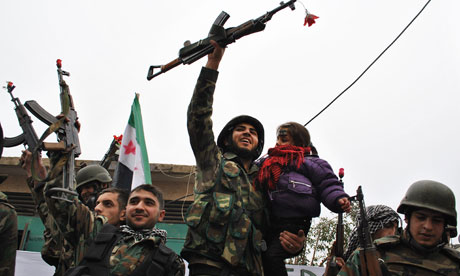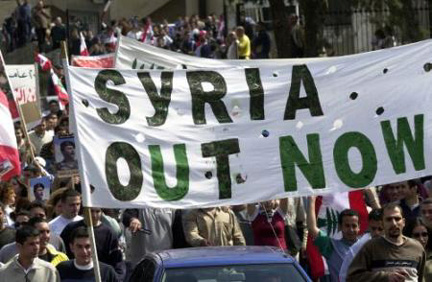
The protest in Tunisian lit a match that sparked a revolution throughout the Middle East. Two years into this massive protest Syria struggles to find peace and tranquility amiss perpetual violence. The Al-Assad regime has promised to compromise and make political and economic concessions, but for the protesters the reforms were nominal.
In the summer of 2011, several youth were arrested and charged with anti-government graffiti. The massive protest led to a large crackdown by security forces that resulted in the death of 55 Syrians.
Many Syrians compared the violent government actions in Daraa to what occurred in Hama 30 years earlier.
In 1982 the security forces in Syria arrived in Hama and killed 20,000 people to prevent the Muslim Brotherhood from usurping power Recently, there have been unverified reports from Sanamein that police fired in a crowd killing twenty people.
Not every Syrian is in support of the uprisings.There have been pro-Assad rallies as well such as in Umayyad Square where supporters waved flags of support. Still, its hard to trust the intentions of the Syrian regime when countless reports show that the Syrian security forces are beleaguering the protesters into submission.
More importantly, is how should the international community respond to this crisis? On the one hand we have an obligation to protect those who are victims of violence on the other hand nations are obligated to respect the territorial integrity of sovereignty.
The Baathist Way
Like many nations under colonialism Syria gained independence after world war two. Since 1970 the Baathist party has had a political monopoly in Syria. During that time the Syrian economy began to suffer as the country spent more on the military and less on development (Syria owed the Soviet Union $11 billion for military expenditures.) However, since 1991 Syria has opened its economy to free markets by encouraging foreign investment.
In addition, to its economic problems the relationship between Syria and the United States since the Baathist party assumed power has been volatile. Under the Carter administration the U.S. supported the brutal regime of Hafez Al-Assad and in 1976 supported Syria against Palestinians. Less than 20 years later Syria supports the United States against Saddam Hussein in the Gulf.
Despite these signs of cooperation, the relationship was not perfect. Under the Bush administration, the president initiated the Syria Accountability Act which curtailed any advancements in diplomacy the two countries had made with each other. At the beginning of the millienium, anti-Americanism in Syria began to intensify and during the Iraq war U.S. officials claimed that Syria aiding the insurgency in Iraq. Finally, in 2006 the U.S. embassy was attacked by islamic militants.
The military solution
In response to the recent uprisings politicians have called for military intervention. Recently, Senator Mark Kirk and Senator Jon Kyl have advocated for a military coup in Syria. However, given the wars in Iraq and Afghanistan, it will be hard for politicians to get support from the American public.

The failures of military interventionism did not begin with the Iraq. The most notable failed intervention occurred in the early 90s when Clinton decided to send forces in Mogadishu. After American troops were killed mercilessly during "Black hawk Dawn" Clinton realized the mission had failed horribly and decided to pull troops out.Despite the underlying altruistic intentions for intervening in Somalia,yet with 2000 Somalians considered "Collateral Damage" since "Black Hawk dawn" Somalia was a bad investment in foreign policy.
Another failed attempt at interventionism is Yugoslavia. Even the Secretary of State under Clinton, said that the intervention in Yugoslavia was a foreign policy mistake because the ethnic tensions will never end. Although Peace keeping were sent to the small eastern European nation it did not do much. According to Human Rights Watch, NATO, in an effort to protect civilians ended up killing 500 civilians in Kosovo using airstrikes.
The Power of the Gun
Although, many believe that the military interventions starting with the Clinton administration were more beneficial than harmful. There are many who believe that force has a role in ending conflict. According to Jon Western, an associate professor of International Relations at Mount Holyoke College, "Over the past twenty years the international community has grown increasingly adept at using military force to stop or prevent mass atrocities."

In the aftermath of the Bosnian genocide that ended with 7,000 Bosnian Muslims killed there were 161 war criminals who had been prosecuted under the International Criminal Tribunal for The Former Yugloslovia. The success in Bosnia was a mix of military efficiency and diplomatic persistence. Under Operation Deliberate Force, NATO sent in 60,000 armed troops, while American diplomat Richard Holbrooke drafted the Dayton Agreement--both actions were instrumental to ending the conflict in eastern Europe.
In addition, while many critics hold pertinacious views against American interventionism and use Iraq as a paradigm to judge all military interventionism, they simultaneously ignore the successes in Cote d'ivoire and Libya. In Cote d'ivoire UN Peace Keepers were sent to help the people dispose of their leader, President Larent Gbagbo, who refused to step down after elections resulted showed he lost and a civil war ensued leaving 3,000 people dead.
There is also non-anecdotal evidence as well. A study conducted by political Scientist Taylor Seybolt found that intensive military operations were key to obviating many ongoing conflicts in war torn areas. Moreover, according to the Human Security Report from 1992-2003 the number of world conflicts decline by 40 percent.
Part of the solution to successfully ending conflict in any part of the world is getting regional support. Good examples include, Australia's intervention in Indonesia after East Timor became independent, Cote d'ivoire, Liberia and Sierra Leone. Other examples include Vietnamese response to the Khmer Rouge in Cambodia, India's preventive actions against state terrorism in Bangladesh and Tanzanians assistance in overthrowing the brutual dictator Idi Armini in Uganda.
However, use of regional forces can be the problem and not the solution in some cases. For example, the Syrian occupation of Lebanon has intensified tension between Beriut and its northern neighbor. The Bush administration used diplomatic measures including proposing UN resolution 1559 and recalling the American ambassador to Syria.

These efforts, in addition to massive protests at Martyrs square in Beirut, in response to the assignation of pro-indepent leader Rafiqi Harari led to the departure of Syrian troops. This might explain the violent attacks against the U.S. Embassy in Damascus the following year.
The use of regional power to intervene could get further complicated if competition for natural resources is not considered. A good example of this is when Turkey build the Ataturk Dam in 1990 and diverted water from the Euphrates away from Iraq and Syria. Syria's agriculture is heavily dependent on irrigation especially because it uses domestic cotton to support its textile industry. Regional intervention in this case might be seen as an attempt to increase control over natural resources rather than to bring peace and stability.
When the bullets run out
In many cases millitary force is not enough. The first step to ending a civil conflict is conducting a fact finding mission such as in Darfur, Palestine or Tajikistan to understand the social, political and economic factors contributing to the problem.
According to Benjamin A. Valentino,associate professor of Government at Darmouth College, the U.S. should shift its strategy from military intervention to humanitarian and focus on public health programs, disaster relief, and ensuring the safety of refugees who are displaced because of a conflict.
Another action that should be adopted on a regional level is the emigration of refugees to neighboring states. From 1933-1939 70 percent of Germany's Jewish population were able to leave their country as Hitler had ascended to power. This is also true of Sudanese who fled to Chad from Darfur and Chinese who escaped to Tawian during the Chinese Civil War.

In addition, just as regional countries play an important role in ending civil conflict so does the larger international community. According to UN Security Council Resolution 668 the international community has an obligation to protect against war crimes, genocides, and crimes against humanity. However, translating theory into practice is harder than it appears. The resistance from Russia and China, the largest contries in the Security Council, is making it harder to contain and manage the crisis in Syria.
Much of the resistance from China and Russia is for historical reasons. The accidental bombing of the Belegrade Embassy in 1999, coupled with Russian interest in Kosovo has made it harder for these three countries to (China, Russia, United States) reach a consensus on global intervention. Still, while the Russian and Chinese vetos should be condemned, The United States, should realize its veto record is not always conducive to enhancing human rights.
There is no shortage of examples, live ammunition against peaceful protesters, abuse of detainees, that demonstrate the brutality of the Syrian regime. The international condemnation and opprobrium that Bashar Al-Assad faces will only intensify if he does not show serious signs of progress. According to Professor Stephen Zunes, Is a Professor of Politics and International Studies at the University of San Francisco:
"Decades of human rights abuses, sectarian divisions, suppression of independent civil society institutions, ubiquitous secret police, and an overall culture of fear have made it difficult to build a unified opposition movement."
This is why a successful outcome in Syria will depend on a multilateral approach involving many countries with divergent interest. The imperious need for a comprehensive solution in Syria will likely contain political inclusion, social reconciliation and economic justice. Like Tunisia Syria is country yearning for a revolution. Humanitarian intervention is not perfect and may have its flaws, but inaction is never the answer.

there is the right to action.China and Russia are only spectators.They are themselves involved in violation of human rights.The Arab league is too slow in its action.Need for quick intervention from Europe and others.
ReplyDelete